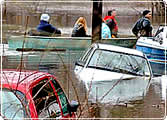Why is climate change an ethical issue?
The Global Humanitarian Forum, led by former United Nations leader Kofi Annan, claims  300,000 people already die every year because of the effects of climate change.
300,000 people already die every year because of the effects of climate change.
This happens through famine, drought, natural disaster or conflicts that have been in some way caused by a change in climate. This is quite a claim and suggests a tragedy unfolding. But if we are to act to do something about the crisis, we need to truly understand what is going on.
Several key questions come from this:
- How good is the evidence that the climate is changing?
- How much is it changing now and how might it change in the future?
- What might be the effects on people and other life on Earth?
- Why is it changing?
- What can be done to stop it?
These sound like simple questions, but actually they are very difficult to answer with any certainty. However, the precautionary principle suggests that if we suspect that climate change might be causing harm, we should aim to do something to prevent that harm. The big issues are:
- what to do?
- whose responsibility is it to do it?
- what might the consequences be if we do the wrong thing?

"Climate" versus "the weather"
The term 'climate change' refers to long-term trends in the average climate, such as changes in average temperature. "Climate" and "weather" are not the same. The weather happens over a very short period of time, hours or days, whereas climate is what the weather is doing over many years.
Climates do change naturally over long periods of time. But climate change in the ‘modern context’ refers to a change in climate that is attributable directly or indirectly to human activity that alters the composition of the atmosphere.

 Text equivalent:
Text equivalent:
Protecting that which we hold in common with others
The atmosphere and the oceans are the reponsibility of us all - or are they? Text equivalent:
Text equivalent:
Present & future generations:
Do we have a responsibility to protect our environment for future generations and, if yes, can we agree about whose responsibility it is?
 Text equivalent:
Text equivalent:
Managing conflicting interests
Climate change will impact differently upon different countries with developing countries being particularly at risk. How do we decide how much each should contribute to proposed solutions?
 Text equivalent:
Text equivalent:
Limits of science knowledge
There are limits to what science can find out or be certain about. Given the seriousness of the consequences of climate change there are huge pressures for clear answers but sometimes this simply isn't possible. Text equivalent:
Text equivalent:
Precautionary Principle
Even if we are not 100% certain the precautionary principle suggests that, given even a small degree of risk, we should err on the side of caution.

 Climate ethics: Why does a change in climate matter?
Climate ethics: Why does a change in climate matter?















